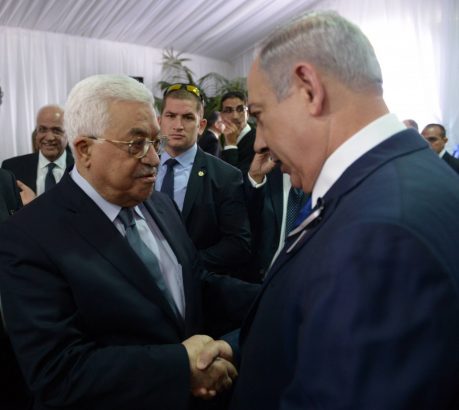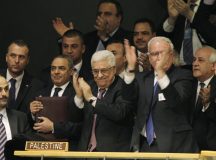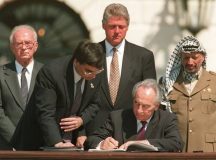Orna Mizrahi is the former Israeli Deputy National Security Adviser for foreign policy and a steering committee member of the ‘Dvorah Forum, Women in Foreign Policy and National Security’. In this essay, she argues that a number of factors in the Israeli-Palestinian arena, the region and internationally mean there is neither pressure on nor incentive for either side to renew negotiations. In light of this, she recommends the Trump administration postpone the publication of its ‘deal of the century’ and focus on creating the right environment for the parties to return to the negotiating table, not least by improving its own relations with the Palestinians. In this context, and to encourage the Palestinian leadership, the US should bring the pragmatic Arab states (Egypt, Jordan, Saudi Arabia and the Gulf states) into the process. Download a PDF version here.
As we mark the 25th anniversary of the Oslo Accords, which were at the time perceived as the greatest opportunity for a solution to the Israeli-Palestinian conflict, it seems that this scenario has become an ever more elusive dream.
In the course of the talks that have taken place between the sides over the years, whether directly or through American mediation, it seemed possible to outline the main guidelines of the potential permanent status agreement in the spirit of the Clinton Parameters (December 2000). However, after the failure of the 2001 talks led by President Bill Clinton, and with the outbreak of the Second Intifada, the difficulty in promoting such agreement in light of the gaps between the sides was revealed. It also became clear that the short timeframe set in the Oslo Accords was unrealistic.
The rounds of negotiations after the Hamas takeover of the Gaza Strip – the Annapolis process during the period of Prime Minister Ehud Olmert (2007-2008) and the US attempts to renew the negotiations between the parties during the period of Prime Minister Benjamin Netanyahu (2013-2014) – also failed. Nevertheless, many believed, and still believe, that achieving a permanent agreement based on the two-state solution set forth in the Oslo Accords is the preferred option, able to provide a solution to the security, political and economic interests of both sides as well as their national aspirations. The efforts reportedly being made by the administration’s peace team seem to also be based on this concept.
President Donald Trump has declared his intention to present a peace plan that will constitute the ‘Deal of the Century,’ but almost two years have passed and his team is finding it difficult to formulate an outline that will enable a return to the negotiation table.
In this article, I will not discuss the reasons for the failure of the previous rounds of negotiation, but rather the relevant question for today: Why have no negotiations been conducted between Israel and the Palestinians in recent years?
My main argument will be that this is a result of a combination of changes in the Israeli-Palestinian arena, alongside developments in the region and internationally, which have pushed aside the Israeli-Palestinian conflict and enabled both sides to avoid entering into meaningful negotiations, which would require them to make painful compromises and difficult decisions.
The Israeli-Palestinian arena
First we must note the impact of the changes that have occurred in recent years in the Israeli-Palestinian arena:
The situation in the Gaza Strip – the lack of security and stability in light of the frequent rounds of violence since Hamas took over the Gaza Strip, and the deteriorating humanitarian situation, have created an urgency for a regional and international response and pushed aside the preoccupation with the wider Israeli-Palestinian conflict.
Moreover, if in the past there was a tendency to try and advance a diplomatic process that deals with the core issues without referring to the situation in Gaza – such as in the Annapolis process and the [former US Secretary of State] John Kerry-led talks – in the current situation it has become clear that it is difficult to ignore the split between the Gaza Strip and the West Bank and the fact the Palestinian Authority (PA) is not in control of Gaza. To reach a comprehensive solution it is essential to first address the issue of Gaza, both to achieve security and to prevent a humanitarian crisis there.
At the same time, the Palestinian strategy regarding the preferred way to achieve an independent Palestinian state has changed. In the past few years, the Palestinian leadership led by PA President Mahmoud Abbas has not seen negotiations – especially not American-led negotiations (even before the Trump administration) – as the preferred means to establish a Palestinian state. The new Palestinian strategy was based on the perception that the Palestinians would be able to achieve better results by appealing to the international community, with an emphasis on the UN and other international organisations, in which the Palestinians have a clear advantage over Israel. According to this strategy, international pressure on Israel will mean the burden of compromise and concessions will fall mainly on Israel’s shoulders. The Palestinians have also tried to increase the bilateral recognition of a Palestinian state by supportive countries around the world. Israel, for its part, has viewed this new Palestinian policy as yet another proof of its lack of interest in engaging in bilateral negotiations, and has been forced to work within the international arena to counter the Palestinian strategy.
Another factor shaping Palestinian policy has been the struggle for succession, for ‘the day after’ Abbas. This internal struggle also undoubtedly affects the current policy of the 83-year-old leader, who is interested in leaving behind a legacy of achievements vis-à-vis Israel, rather than making the painful concessions required in order to advance a comprehensive agreement.
The failures of the past attempts to advance the peace process and the ongoing stagnation also contribute to feelings of despair and loss of confidence in the possibility of reaching an agreement within both Palestinian and Israeli societies. Consequently, other voices, offering different solutions that are not based on the two-state solution, are heard. In this regard we can also note the changes within the Israeli government, which includes right-wing parties. This change reflects the despair and distrust felt by many in Israeli society in the political process, even though Israel’s official position on reaching a resolution to the Israeli-Palestinian conflict has not changed.
The daily reality in the West Bank also affects both side’s attitude towards the possibility of an agreement. This is expressed on the one hand by Israel, which, despite security cooperation with the PA, is concerned about the continuation of Palestinian terror and incitement; and on the other, by the Palestinian anxiety over the Israeli expansion of settlements in the West Bank creating a reality that will prevent the establishment of a viable Palestinian state.
To these reasons one can add the basic distrust between the leaders of both sides: Prime Minister Netanyahu and President Abbas have had no direct, substantive or continuous dialogue since their first meeting in September 2010.
Region
At the same time, there is a lack of interest in dealing with the Israeli-Palestinian conflict in the region with most countries diverting their attention to more pressing issues related to their own national security, namely the regional turmoil and the growing Iranian threat. In recent years the Palestinian issue has not topped the agenda of the Arab world. The profound changes that have occurred following the regional upheavals have undermined the old order within Arab countries and has changed the balance of power between the strongest actors in the Middle East. Somewhere in the process, the attitude towards Israel also changed.
The civil wars in the Middle East have dealt a severe blow to the radical (in their attitude to Israel) regimes such as Libya and Syria, while exposing the pragmatic Sunni camp to the positive potential in advancing relations with Israel in a way that serves their interests against the threats they face. These threats mainly consist of the increasing challenge by Iran, and the threat of terrorism by radical Sunni elements such as ISIS.
Since the nuclear agreement (JCPOA) with Iran in July 2015, the threat that Iran poses has become more tangible. Iran has taken advantage of the earthquake in the Arab world for its own benefit by establishing and leading the Shiite axis, as well as expanding its involvement in all areas of conflict throughout the Middle East, including Syria and the Arabian Peninsula.
Under these circumstances, a broad basis for cooperation was established between Israel and the Gulf states, led by Saudi Arabia and Crown Prince Muhammad bin Salman who set new priorities within Saudi foreign policy, which do not express any interest in dealing with the Palestinian issue. However, one cannot ignore the fact that despite pushing aside the Palestinian issue, the Israeli-Palestinian conflict remains the main obstacle to public exposure of the developing ties between Israel and these countries.
International
Simultaneously, there has been a significant drop in international pressure on Israel and the Palestinians to move toward an agreement. This change stems mainly from the election of President Trump and the subsequent changes in US foreign policy. While Trump declared his interest in dealing with the Israeli-Palestinian conflict, as time has gone on, it has become evident that there are more urgent matters for the administration to deal with, including the Trans-Atlantic relationship, North Korea, Iran, and Russia. Two years have passed and while Trump still shows interest in publishing his peace plan, his staff are struggling to design the deal and there have been a series of delays to its release.
Moreover, President Trump’s decision to transfer the American embassy to Jerusalem in May 2018 was perceived by the Palestinian side as leaving the US unable to serve as an ‘honest broker’. This contradicts Israel’s well-known position that the Americans are the only relevant mediator able to advance the political process.
In addition, there has been a decline in the preoccupation with the Israeli-Palestinian conflict by other powers, such as France, which tried at the end of François Hollande’s term to advance the idea of an international peace conference. The lack of interest in Western Europe stems not only from the priority given to dealing with other urgent issues, but also from the lessons drawn from the failures of past attempts and the realisation that there is no chance of advancing such a move today.
Conclusion
It seems that neither side – each from their own perspective – has the motivation at present to advance the political process. At the same time, there are no forces, internationally or regionally, to push Israel or the Palestinians forward toward negotiations, especially when the current focus is on the explosive situation in the Gaza Strip.
Under these circumstances, and assuming that the promotion of bilateral negotiations between Israel and the Palestinians on the basis of the idea of ‘Two States for Two Peoples’ is still the preferred alternative, it is my understanding that the key to breaking the deadlock is still in the hands of the Americans, but not through the publication of the ‘ultimate deal’.
It would be better if US postponed the publication of its position on the permanent-status issues at this time because such a move could be counterproductive and provoke opposition on both sides, as well as contributing to the continued stagnation of the negotiations. Instead, the administration should first focus its efforts on creating the right environment for the parties to return to the negotiating table. This should be done through promoting renewed trust between Israel and the Palestinians and through the restoration of US relations with the Palestinian side. In this context, it is very important to include the pragmatic Arab states (Egypt, Jordan, Saudi Arabia and the Gulf states) into the negotiations, which may help to encourage the Palestinian leadership to join the process.





































The author of this article Orna Mizrahi must have been in a very deep sleep for the past 15 years. Not only has every US president forced Israel to make concessions prior to sitting down with the palestinian leadership, they palestinian leadership never sat down to seriously discuss any peace agreement. They took Israel’s concessions (release of murderers, freezing construction etc) and then demanded more concessions.
President Trump has not presented his peace plan because during the past 2 years, his eyes have been opened to the hypocrisy, the lying and the actual facts on the ground showing not only what UNWRA has been doing all these years, but also what the UN does (big hep from Nikki Haley here) and he has realized that there is no partner here to speak of. He will make an attempt to get real countries to step up to the plate, but I can assure you now, that no arab countries will agree. The only left for him to do now, is to strangle the current leadership in the West Bank as well as Gaza, and hope that new leadership will take over. Until then, as any good businessman knows, when your opponent is desperate, you don’t throw a lifeline, you keep waiting until they scream “uncle” and agree to all your demands.
The only solution is to disabuse the Arab “Palestinians” of the futility of pursuing their dream of deleting Israel.
How to achieve that?
President Trump has made a good start.